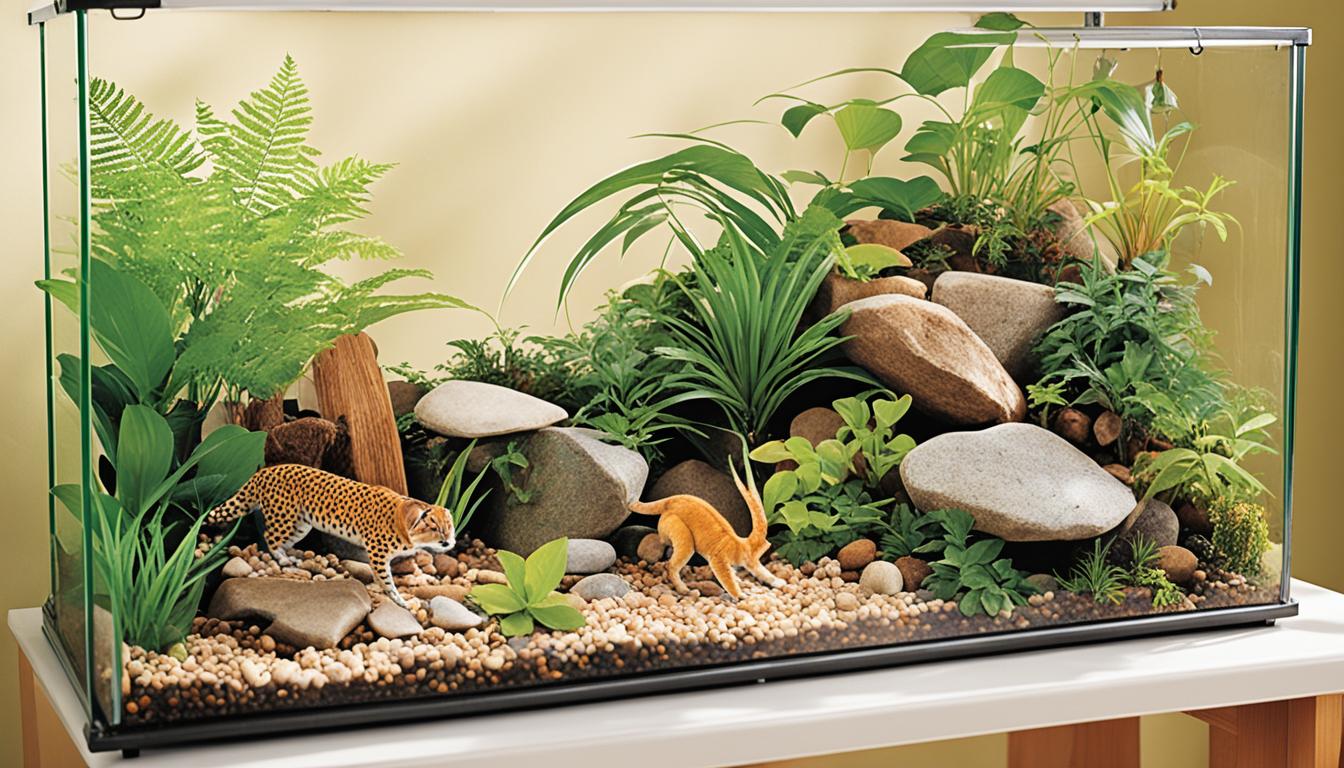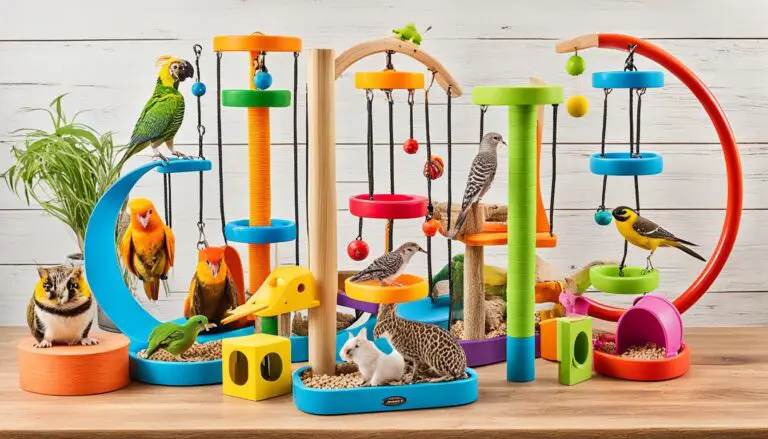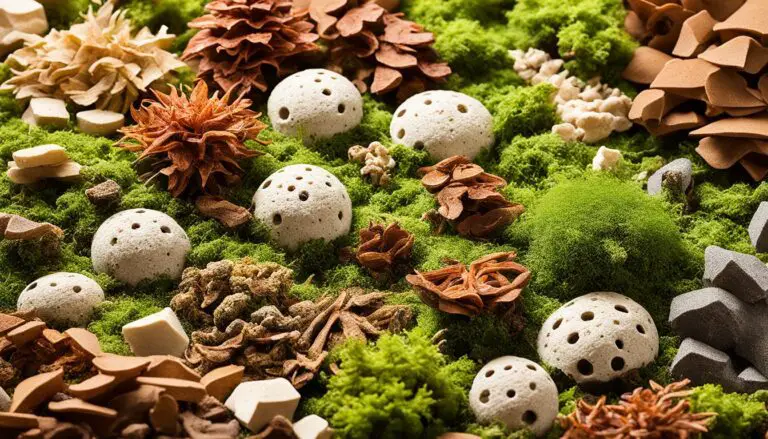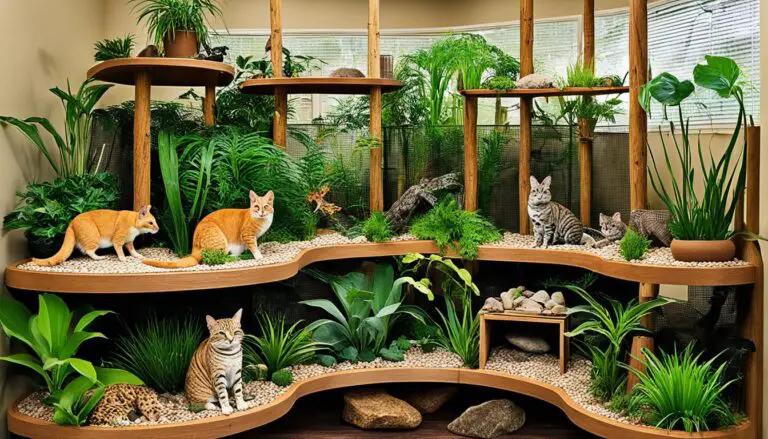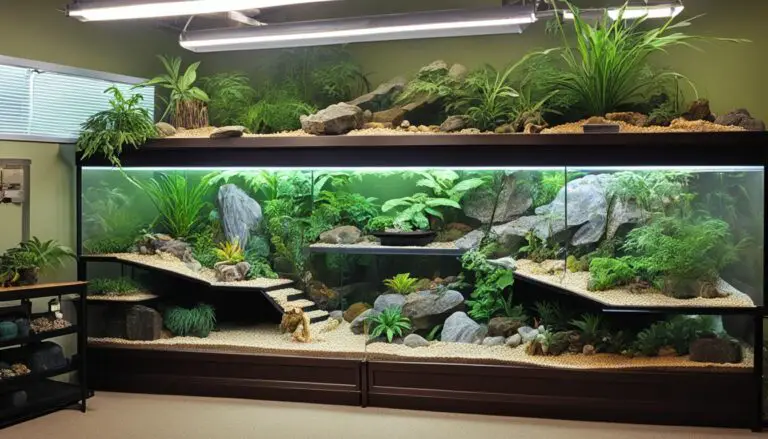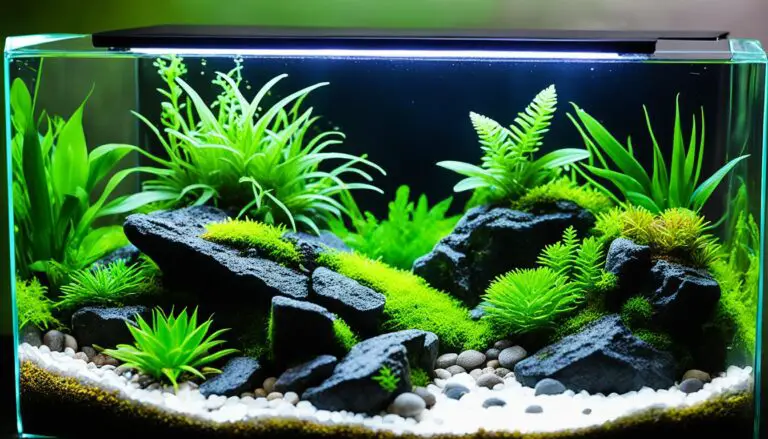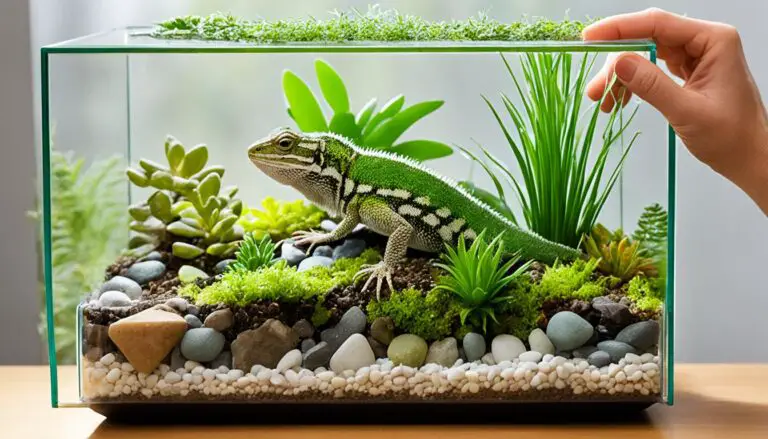Exotic Pet Indoor Housing Solutions & Tips
Creating a safe and cozy home for exotic pets indoors is key. This includes pets like reptiles, birds, small mammals, or amphibians. We’ll share top tips and solutions for making the best indoor homes for your unique pets.
Key Takeaways:
- Selecting the right housing is crucial for creating a safe and comfortable environment for exotic pets.
- Understanding the specific needs of each type of exotic pet is essential in providing them with suitable indoor enclosures.
- There are a variety of housing options available, such as terrariums, vivariums, and custom-built enclosures, depending on the type of exotic pet.
- Important considerations for exotic pet housing include safety, appropriate substrate, temperature regulation, and providing enrichment.
- Temperature, lighting, and behavioral needs should be carefully considered when designing the indoor habitat for exotic pets.
Understanding Exotic Pets and Their Needs
Exotic pets include animals like small mammals, reptiles, birds, and amphibians. Knowing their specific needs is crucial for the best indoor housing. This ensures they have enclosures that meet their requirements.
When choosing housing, size matters a lot. Different animals need various amounts of space. Providing enough room for them to move and play is key. For instance, small mammals such as rabbits and guinea pigs need big spaces. These should have areas for eating, sleeping, and playing.
Keeping the right temperature is also vital. Reptiles need specific temperature ranges for their health. Heat pads or lamps can provide these necessary conditions.
Proper lighting is crucial, especially for reptiles and amphibians. They may need UV-B light for vitamin D. This is important for their health. Special bulbs can provide the right light.
The right substrate is essential too. For reptiles, choosing something like sand or bark can mimic their natural home. This depends on the species.
“Understanding the specific requirements of each type of exotic pet is crucial in providing them with the best indoor enclosures.”
Consider size, temperature, lighting, and substrate for a safe space. Consult experts or research to understand your pet’s needs better. This helps in creating the right living conditions.
Benefits of Proper Housing
Good enclosures ensure the safety and health of exotic pets. They prevent escape and accidents. Managing temperature and light is possible too. This keeps the animals healthy.
Such housing also entertains and enriches your pet’s life. Mimicking their natural habitat and adding toys can prevent boredom.
Understanding what exotic pets need and providing suitable housing is key to their happiness.

In creating a good indoor space, there are many options. Next, we will look at terrariums, vivariums, and custom habitats for exotic pets.
Housing Options for Exotic Pets
For exotic pets, housing them indoors requires careful consideration. Different pets, like reptiles, birds, or small mammals, need different types of homes. Let’s look at some good options to keep your exotic pet safe and happy.
Exotic Pet Terrariums and Vivariums

Reptiles such as lizards, snakes, or turtles do well in terrariums and vivariums. These homes offer the right temperature, humidity, and light. Terrariums have glass walls and open from the top for easy care. Vivariums feature a natural look with plants, ground cover, and water areas. Both are great for creating a cozy space for your reptile pals.
Unique Custom Indoor Pet Habitats
Custom enclosures are great for small mammals like rabbits, guinea pigs, or ferrets. These habitats give them lots of space to move and play. Add levels, tunnels, and toys to keep them busy and happy. These homes not only feel good for your pets but also let you get creative.
Spacious Bird Cages
Birds need big cages to stretch their wings and fly. Choose cages that have room for perches, toys, and dishes. The cage bars should be spaced right to keep your bird safe. Think about your bird’s size and how they act when picking a cage. A good cage with toys keeps birds joyful and active.
Reptile Terrariums
Reptiles like geckos or chameleons need special homes too. Terrariums for reptiles are big and safe. You can pick from many sizes and styles to match their wild home. These homes usually have branches to climb, places to hide, and sunning spots. A well-set-up terrarium is key for your reptile’s health and happiness.
Comparison of Housing Options for Exotic Pets
| Housing Option | Benefits | Recommended For |
|---|---|---|
| Exotic Pet Terrariums and Vivariums | – Controlled environment – Ideal temperature and humidity – Perfect for reptiles |
Reptiles such as snakes, lizards, or turtles |
| Unique Custom Indoor Pet Habitats | – Tailored to specific needs – Plenty of space for exercise – Enrichment opportunities |
Small mammals like rabbits, guinea pigs, or ferrets |
| Spacious Bird Cages | – Room for flying and perching – Mental stimulation with toys – Safe and secure |
Birds of various sizes and species |
| Reptile Terrariums | – Spacious and secure environment – Naturalistic features – Climbing and hiding opportunities |
Reptiles such as geckos or chameleons |
When picking a home for your exotic pet, think about what they need and where they’re from. Also, consider how much room you have. Talking to experts or other pet owners can help you decide.
Important Considerations for Exotic Pet Housing
When setting up homes for exotic pets indoors, several key points must be remembered. First, keeping your pets safe is the top priority. So, make sure their home can’t be escaped and is free from dangers. This keeps your exotic animals safe and secure inside.
It’s also vital to make your pet’s enclosure feel like their natural home. Choose the right ground cover, add hiding spots, and climbing areas too. These additions help your pets act naturally and stay happy and healthy.
Reptiles need special care in their homes, like keeping the right temperature and moisture levels. Understanding what your pet species requires is important. You might need to add heat sources and ways to control humidity just for them.
Birds and small mammals need good air in their homes, too. Making sure there’s enough fresh air stops harmful stuff from building up. This keeps your pets living well and feeling great.
Pet Enclosure Ideas
Being creative with your pet’s home can really make a difference. Use natural or fake plants, rocks, or branches to make their space look great and feel fun. Also, toys and puzzles keep your pets busy and happy.
A safe indoor place is a must for the happiness and health of exotic pets. By considering their needs and using great ideas for their homes, you can make a space that supports their natural ways and keeps them healthy.
For a quick guide on what to think about for exotic pet homes, see the table below. It lists everything important for creating a great living space.
| Considerations | Description |
|---|---|
| Safety | Ensure the enclosure is escape-proof and free of hazards. |
| Substrate and Environment | Select appropriate substrate, provide hiding spots, and incorporate climbing structures. |
| Temperature and Humidity | Regulate temperature and humidity to meet the needs of reptiles and other temperature-sensitive animals. |
| Ventilation | Ensure proper airflow to maintain a healthy indoor environment. |

Keep these tips in mind and choose the right ideas for your exotic pets’ home to give them a safe and happy place. Always talk to experts and do your research for your pet’s needs to ensure their good health.
Feeding and Watering in Exotic Pet Enclosures
Feeding and watering your exotic pet properly is key to their health. It’s important to give the right food and water access. Make sure to know and meet their unique dietary needs.
Feeding Exotic Pets
Each exotic pet needs a diet fit for their species. For instance, reptiles in reptile terrariums may eat live insects or special diets. Meanwhile, small mammals in small pet vivariums often need fresh fruits, veggies, and pellets.
Consulting a vet or a pet specialist is vital for proper nutrition. They can recommend commercial foods or homemade meals for your pet.
Watering Exotic Pets
All exotic pets must have clean, fresh water. Water bowls or misting systems work, depending on the pet. Regularly cleaning and refilling water sources keeps your pet’s home clean.
“Proper hydration is essential for your exotic pet’s health. Regular water source checks ensure they stay hydrated.”
To find out your pet’s water needs, talk to a vet or research their species. High humidity or misting systems may be necessary for some pets.
Setting a feeding and watering schedule is vital. Always keep food and water sources clean. This helps keep your pet healthy and happy.

| Exotic Pet | Feeding Recommendations |
|---|---|
| Reptiles (e.g., snakes, lizards) | Live insects or specialized diets. Consult with a veterinarian or exotic pet specialist for appropriate options. |
| Small Mammals (e.g., rabbits, guinea pigs) | Combination of fresh fruits, vegetables, and fortified pellets. Consult with a veterinarian for specific recommendations. |
| Birds | Variety of bird seeds, fresh fruits, and vegetables. Consult with a veterinarian or avian specialist for appropriate options. |
| Amphibians (e.g., frogs, salamanders) | Live insects or specialized diets formulated for amphibians. Consult with a veterinarian or amphibian specialist for appropriate options. |
Temperature and Lighting Needs for Exotic Pets
Creating an ideal indoor setup for your exotic pet is crucial. Temperature and lighting are key factors. They help keep your pet healthy and happy.
A Temperature Gradient
Reptiles need a range of temperatures in their space. They need warm spots to bask and cooler areas to chill. You can use heat pads or lamps to make sure these spots are just right.
“Maintaining a proper temperature gradient allows reptiles to thermoregulate effectively, ensuring they stay healthy and active.” – Dr. Joanna Peterson, Reptile Specialist
UV-B Lighting for Reptiles
Lizards and turtles need UV-B light to stay healthy. This light helps them make vitamin D, which is vital. You can buy bulbs and fixtures that give off UV-B rays.
Proper Lighting Schedule
It’s important to have a regular light schedule for your pets. Many reptiles need 12-14 hours of light and 10-12 hours of dark each day. This copies their natural living conditions. Talk to a vet or reptile expert to find out what your pet needs.
Monitoring and Regulation
Keep an eye on the temperature and lighting. This ensures they’re always perfect for your pet. Use tools like thermometers and light meters to help. Don’t forget to adjust for changes in seasons.
By focusing on temperature and lighting, you make a great home for your exotic pet. This keeps them strong and happy.
Exotic Pet Behavioral Needs in Indoor Enclosures
Having exotic pets indoors is about safety and meeting their need to act naturally. Different pets need different things to feel at home. A space that mimics their natural habitat boosts their happiness and health.
Exercise and Mental Stimulation
Exotic pets like birds and small mammals need space to move and things to solve. Toys, tunnels, and structures support their need to explore. Birds love perches at different levels for exercise. Small mammals enjoy tunnels for play.
“Creating a stimulating indoor environment is essential for an exotic pet’s mental and physical health. Providing plenty of toys and activities helps prevent boredom and encourages natural behaviors.”
Secure Hiding Spots
Reptiles and some exotic pets seek safety in hidden places. Enclosures should have hiding spots to make them feel secure. Snakes and lizards, for instance, need spots to hide when scared. You can use rocks and branches for this.
Understanding your exotic pet’s behavior helps you meet their needs. A variety of activities and hiding places makes them thrive. Ensuring their enclosure mimics their natural setting is key to their well-being.
Specialized Veterinary Care for Exotic Pets
Exotic pets need specialized care to stay healthy and happy. It’s important to choose a vet who knows about their unique needs. Regular check-ups help keep your exotic pet in good health and spot any issues early.
Access to a vet who knows about proper housing is a big plus. They can help you pick the right home for your pet’s needs. This makes sure their living space is safe and cozy.
Exotic pets, like reptiles, birds, or small mammals, have special requirements. A good vet can give tips on the best kind of habitat for your pet. Following their advice can make your pet’s life better and happier indoors.
“A vet skilled in exotic animals is super helpful for pet owners. They provide specialized care, housing tips, and help with keeping pets healthy. This ensures your pet gets the care they need.”
Vet care isn’t just about regular visits. It includes vaccines and fighting off parasites, which keep your pet healthy for a long time. A vet can offer the right preventive care and answer any questions you have.
When looking for a vet for your exotic pet, check their experience and qualifications. Ask other pet owners for suggestions. Do some research to make sure they can meet your pet’s specific needs.
By focusing on specialized vet care, you can give your exotic pet the support they need. This helps keep them healthy and happy in their home with you.
Cost-Effective Solutions for Exotic Pet Housing
It’s important to provide the right housing for exotic pets without spending too much. Here are affordable ways to build a safe and fun space for your pet:
1. Consider Second-Hand Enclosures, Equipment, and Furnishings
Buying second-hand gear is a smart way to save. Look for gently used items at low prices. Just make sure they’re safe and right for your pet.
2. Get Creative with DIY Toys and Enrichment
You can also create toys and games yourself. Use safe materials to make unique toys. This not only saves money but also lets you customize toys for your pet’s joy.
3. Optimize Energy Usage
Cut costs by using less energy. Group heat and light sources, choose efficient bulbs, and keep enclosures insulated. These steps help lower bills and keep your pet comfortable.
4. Shop for Deals and Discounts
Look for sales and special offers on supplies. Retailers often have deals, especially if you join loyalty programs. Check online and local stores for the best prices.
5. Consider Long-Term Value
Think about the long-term benefits when choosing a pet’s home. It’s smarter to invest in a durable enclosure that lasts longer. High-quality items also have resale value if you ever need to sell them.
By following these tips, you can set up a great living space for your exotic pet without spending too much. Always keep your pet’s happiness and health in mind when making decisions.
Conclusion
Creating the best indoor home for your exotic pet is key. It keeps them happy and healthy.
Start by knowing what they need. Choose the right cage or tank. Make sure the temperature and light suit them. Think about how they act too.
Don’t forget to take them to the vet regularly. Finding ways to save money is also smart. This way, your pet will do well in their indoor habitats for exotic animals for many years.
FAQ
What are the important considerations for exotic pet housing?
What are some housing options available for exotic pets?
What are the temperature and lighting needs for exotic pets?
How can I meet the behavioral needs of my exotic pet in its indoor enclosure?
Why is specialized veterinary care important for exotic pets?
How can I create a cost-effective housing solution for my exotic pet?
Source Links
- https://www.rspca.org.uk/adviceandwelfare/pets/other
- https://twinmaplesvethospital.com/exotic-pets-what-you-need-to-know/
- https://www.swanimalhospital.net/exotic-pet-care-tips
Peter Stones is the founder of Exotic Pets Place, the leading online resource for exotic pet care information.
With over 10 years of hands-on exotic pet ownership experience, he is deeply passionate about sharing his expertise to help others properly care for their unusual pets.
When he's not writing extensively researched articles or connecting with fellow exotic pet enthusiasts worldwide, you can find Peter at home tending to his own beloved menagerie of exotic animals.

